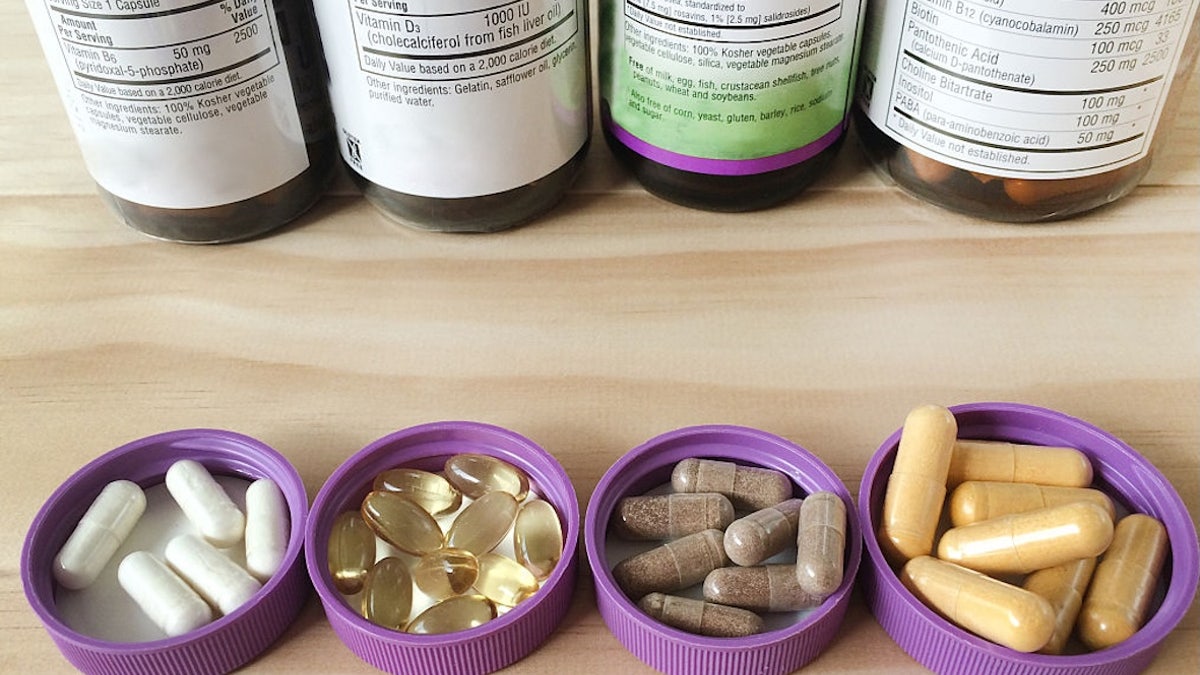Health
Arkansas toddler dies of rare brain-eating amoeba infection likely contracted at country club splash pad

A toddler who was his parent’s “pride and joy” died from a brain-eating amoeba after playing at an Arkansas country club’s splash pad.
Michael Alexander Pollock III, a 16-months-old, passed away on Sept. 4, after contracting the rare brain-eating infection while his parents, Michael Jr. and Julia Pollock, were out of state, Arkansas Online said.
In a press release, the Arkansas Department of Health confirmed that the toddler had died from an infection caused by the amoeba, also known as Naegleria fowleri. Officials said that the young toddler was likely exposed to the brain-eating amoeba while playing in a splash pad at a Little Rock, Arkansas, country club.
Brain-eating amoeba, Naegleria fowleri, 3-D illustration. (iStock)
The Health Department sent water samples to the Centers for Disease Control and Prevention, which confirmed that one sample had traces of the amoeba, the press release said.
The Country Club of Little Rock closed its pool and splash pad voluntarily and there is no ongoing risk to the public, officials said. The state’s Health Department noted that only about three people in the United States get infected each year, but that the infections are usually fatal.
BRAIN-EATING AMOEBAS: WHAT YOU MUST KNOW ABOUT THE RISK OF SWIMMING IN FRESH WATER
In the young child’s obituary, parents wrote that her “touched the hearts of family, friends, and strangers” with his “illuminating smile and playfulness.”

A child cools off on a summer day at a spray park. (Allen J. Schaben/Los Angeles Times via Getty Image/File)
“Michael, born April 24, 2022, was the pride and joy of his parents, Michael Pollock Jr., and Julia Pollock, who survive him,” the obituary said. “Though Michael’s time on Earth was short, he touched the hearts of family, friends, and even strangers he came across with his illuminating smile and playfulness.”
According to the CDC, Naegleria fowleri thrives in warm water, growing best at temperatures up to 115°F. This means that July, August and September are the highest-risk months.
Some experts believe that climate change could make Naegleria fowleri infections more common.
GEORGIA TEEN GIRL IDENTIFIED AS RESIDENT WHO DIED OF BRAIN-EATING AMOEBA AFTER SWIMMING IN LAKE
“As air temperatures rise, water temperatures in lakes and ponds also rise and water levels may be lower,” the CDC’s website states.
“These conditions provide a more favorable environment for the amoeba to grow.”

Naegleria fowleri infects people when water containing the ameba enters the body through the nose. (Image courtesy CDC/Smith Collection/File)
It also says, “Heat waves, when air and water temperatures may be higher than usual, may also allow the amebae to thrive.”
The initial symptoms of the brain-eating amoeba usually begin about five days after exposure, but they can be noticed sooner.
Early signs usually include headache, nausea, fever and/or vomiting, per the CDC.
CLICK HERE TO SIGN UP FOR OUR HEALTH NEWSLETTER
As the infection progresses, people may experience confusion, stiff neck, disorientation, hallucinations, seizures and coma.
Death can occur anywhere between one and 18 days of infection, with an average of five days, the CDC said.
Fox News Digital’s Melissa Rudy contributed to this report.

Health
This Diet Helped Kori Lose 125 Lbs. and Reverse Her Menopause Symptoms

Use left and right arrow keys to navigate between menu items.
Use escape to exit the menu.
Sign Up
Create a free account to access exclusive content, play games, solve puzzles, test your pop-culture knowledge and receive special offers.
Already have an account? Login
Health
Do you need a magnesium supplement? Experts share symptoms of deficiency

NEWYou can now listen to Fox News articles!
Magnesium is said to be a natural remedy for a variety of ailments — but is it really necessary to supplement, and if so, how much do you need?
Fox News Digital spoke to multiple health experts about the multipurpose mineral, which plays a role in over 300 of the body’s enzyme systems and helps with energy production, muscle and nerve function, and blood pressure regulation.
Magnesium may help lower the risk of certain diseases and could help to improve sleep, reduce stress and anxiety, and prevent nighttime muscle cramps, sources said.
COMMON SUPPLEMENTS AND MEDICATIONS COULD CAUSE LIVER DAMAGE, STUDIES SHOW
The nutrient “supports a stable heartbeat and prevents arrhythmias, works with calcium and vitamin D to keep bones strong, and aids insulin sensitivity and glucose metabolism,” Dr. Heather Viola, a primary care physician with Mount Sinai Health System in New York City, told Fox News Digital.
Magnesium can also help with constipation relief, migraine prevention and PMS symptoms, according to Eleana Quattrocchi, a pharmacist and associate professor of pharmacy practice at Long Island University in Brooklyn, New York.
Fox News Digital spoke to multiple health experts about the mineral magnesium, which plays a role in over 300 of the body’s enzyme systems and helps with energy production, muscle and nerve function, and blood pressure regulation. (iStock)
Signs of magnesium deficiency
Many Americans do not get enough magnesium in their diet, according to the National Institutes of Health (NIH) Office of Dietary Supplements.
“Habitually low intakes of magnesium induce changes in biochemical pathways that can increase the risk of illness over time,” the NIH website states.
Studies have shown that up to 15% of people in the U.S. could experience magnesium deficiency.
COMMON DAILY VITAMIN COULD SLOW BIOLOGICAL AGING, MAJOR STUDY SUGGESTS
Lack of magnesium can raise the risk of hypertension, cardiovascular disease, type 2 diabetes, migraine headaches and osteoporosis.
Potential symptoms include insomnia, muscle cramps, constipation, nausea and vomiting, fatigue, weakness, numbness, tingling, personality changes and heart arrhythmias, experts say.

Lack of magnesium can raise the risk of hypertension, cardiovascular disease, type 2 diabetes, migraine headaches and osteoporosis, according to studies. (iStock)
In severe cases, hypocalcemia (low calcium levels) or hypokalemia (low potassium levels) might occur, according to the NIH Office of Dietary Supplements.
Blood tests can help detect low levels, but Viola cautioned that those tests “aren’t perfect” because most magnesium is inside cells, not in serum.
Studies have shown that up to 15% of people in the U.S. could experience magnesium deficiency.
Certain medical conditions, alcoholism, some medications and a diet lacking in the mineral may contribute to magnesium deficiency.
“People with gastrointestinal disease, such as Celiac disease or Crohn’s disease, or those who have had a gastric bypass may develop magnesium deficiency,” Sue-Ellen Anderson-Haynes, a spokesperson for the Academy of Nutrition and Dietetics and a registered dietitian who owns 360Girls&Women in Massachusetts, told Fox News Digital.
How much magnesium do you need?
The recommended daily dietary intake of magnesium is 310 to 320 mg per day for adult women and 400 to 420 mg per day for adult men.
“The majority of magnesium is found in plants liked nuts, seeds and beans,” Anderson-Haynes told Fox News Digital. “For reference, 1 ounce (2 tablespoons) of pumpkin seeds provides 156 mg of magnesium and 1 ounce of chia seeds is 111 mg (26% DV) of magnesium.”
COMMON HOUSEHOLD SPICE MAY INTERFERE WITH MEDICINES, STUDY SUGGESTS
Some specific sources of magnesium include peanut butter, bananas, avocado, nuts (almonds), black beans, leafy greens (like spinach and kale), whole grains, yogurt and dark chocolate.
While dietary sources are the best way to meet daily magnesium requirements, supplements are recommended in certain cases, health experts told Fox News Digital.

Magnesium may help lower the risk of certain diseases and could help to improve sleep, reduce stress and anxiety, and prevent nighttime muscle cramps, sources said. (iStock)
“A supplement should be taken when a known deficiency or a health condition is present with excessive magnesium losses, like alcoholism,” Samantha Dieras, a registered dietitian and director of ambulatory nutrition services at the Mount Sinai Hospital in New York City, told Fox News Digital.
Physicians may recommend supplements for magnesium-deficient patients or for individuals who are taking certain medications, such as diuretics or Proton pump inhibitors that can deplete magnesium, Viola noted.
For more Health articles, visit www.foxnews.com/health
It is possible to ingest too much supplementation.
“You can get too much magnesium, but mainly from supplements, not food,” Viola said. “It’s very safe from food, as kidneys eliminate the excess.”
Over-supplementing can cause diarrhea, nausea and lethargy, according to the expert.
Choosing a magnesium supplement
Magnesium supplements come in different forms for various purposes, which are absorbed in different ways.
CLICK HERE TO SIGN UP FOR OUR HEALTH NEWSLETTER
One of the most popular forms is magnesium citrate, which is typically taken orally to raise levels in the body and alleviate constipation, according to Healthline.
Magnesium chloride is another good choice for correcting deficiencies, and also alleviates heartburn and constipation.

Individuals should speak with their physician before starting magnesium supplements, as it may interfere with some medications and medical conditions. (iStock)
For those who can’t tolerate other forms, magnesium lactate and magnesium malate may be gentler on the digestive system, Healthline noted.
Magnesium taurate is known to have potential benefits for regulating high blood sugar and high blood pressure, while magnesium L-threonate could potentially help support brain health.
“You can get too much magnesium, but mainly from supplements, not food.”
“The magnesium salts used for a calming effect are glycinate and taurate,” Quattrocchi told Fox News Digital.
Magnesium glycinate has also been shown to improve sleep, reduce mental health issues and treat inflammatory conditions, according to Healthline.
CLICK HERE TO GET THE FOX NEWS AP
Individuals should speak with their physician before starting magnesium supplements, as it may interfere with some medications and medical conditions.
Health
3 Readers Lost 448 Lbs—Here Are the Tips They Wish They Knew Sooner

Use left and right arrow keys to navigate between menu items.
Use escape to exit the menu.
Sign Up
Create a free account to access exclusive content, play games, solve puzzles, test your pop-culture knowledge and receive special offers.
Already have an account? Login
-

 Politics1 week ago
Politics1 week agoMichelle Obama facing backlash over claim about women's reproductive health
-

 Movie Reviews1 week ago
Movie Reviews1 week agoThe Verdict Movie Review: When manipulation meets its match
-

 West3 days ago
West3 days agoBattle over Space Command HQ location heats up as lawmakers press new Air Force secretary
-

 Finance1 week ago
Finance1 week agoHere's what will boost your feeling of financial well-being the most, researchers say
-

 Technology1 week ago
Technology1 week agoWhy do SpaceX rockets keep exploding?
-

 World1 week ago
World1 week agoTwo killed in Russian attacks on Ukraine before possible talks in Turkiye
-

 Kentucky1 week ago
Kentucky1 week agoHow Ole Miss baseball’s pitching options will factor in elimination game vs Western Kentucky
-

 World1 week ago
World1 week agoNcuti Gatwa Bids Doctor Who Farewell as Finale Ends With a Most Surprising Twist — Grade It!














